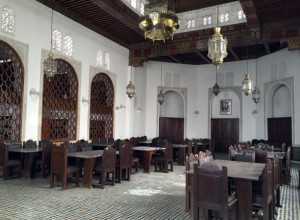ABC News
By Samia Errazzouki, Associated Press

The settling dust from renovations and the banging of tools aren’t ideal sights and sounds for a library — but this is no ordinary library.
Founded 12 centuries ago by a pioneering woman and nestled in the old medina of Fez, Morocco’s University of al-Qarawiyyin library is one of the world’s oldest libraries, home to unique Islamic manuscripts treasured by historians. Yet it’s been largely hidden from the public. The architect leading its restoration, Fez native Aziza Chaouni, didn’t even know it existed until she was asked to work on it.
King Mohammed VI is expected to inaugurate its reopening soon. Chaouni is hoping it will mark an ideological change, too, and open to the public for the first time in its long history. Until now, the privilege of using the library has been limited to scholars who seek formal permission, and authorities haven’t decided yet whether to change that.
From calligraphic designs on the walls to ceramic patterns on the floors and wooden carvings on the ceilings, the fingerprint of almost every ruling dynasty since the 9th century can be seen in the architecture.
A devout and wealthy Muslim woman from the Tunisian town of Kairaouan, Fatima al-Fihri, provided the endowment for building al-Qarawiyyin in the 9th century. Originally a mosque, it expanded in the 10th century to become a university, Abdelmajid El-Marzi, imam and administrator of the mosque, told The Associated Press.
The library houses a collection of manuscripts written by renowned thinkers from the region, including Ibn Khaldun’s “Muqadimmah.” The 14th-century historical work spent six months on loan to the Louvre Museum in Paris during the renovations, library curator Abdelfattah Bougchouf said.
Other texts include a 9th-century Quran written in Kufic calligraphy, and a manuscript on the Maliki school of Islamic jurisprudence by Ibn Rochd, also known as Averroes.
The manuscripts are now kept in a secure room, with strict temperature and humidity control. They weren’t always kept like this, however.
“The original manuscript room door had four locks,” Bougchouf told The AP. “Each of those keys was kept with four different people. In order to open the manuscript room, all four of those people had to physically be there to open the door.”
Now, he chuckled, “all of that has been replaced with a four-digit security code.”
A previous renovation and expansion effort in 1940 opened up the library to foreigners and non-Muslims by creating a separate entrance. Before that, the only way to access the library was via the mosque. Non-Muslims aren’t allowed to enter the Qarawiyyin mosque to this day.
“It was a sign of tolerance,” Abdelfattah said.
Since ascending to the throne in 1999, King Mohammed VI has called for restorations at Qarawiyyin.
Architect Chaouni said she was pleasantly surprised when the Culture Ministry approached her in 2012 to work on the project — especially in a field dominated by men.
“I knew about the mosque, but never even knew there was a library there,” she said, despite growing up in the city.
She specializes in restoring old buildings in a sustainable fashion, and is also trained as an engineer, with degrees from Harvard and Columbia universities.
The restoration is fixing a plumbing issue that increasingly threatened to drench the rare manuscripts in sewage water.
Chaouni is also lobbying for opening a public exhibition room for the first time – calling it “the biggest challenge of my soul” during the restoration project.
The Culture Ministry accepted the idea but bureaucratic control over the site shifted to the Ministry of Endowments and Religious Affairs. Chaouni worries that this shift will squash her efforts. Authorities are also concerned about the cost of keeping the previous manuscripts secure.
Another way to improve access to the manuscripts is to digitize them, which the library has been doing, and about 20 percent are now available in electronic form.







